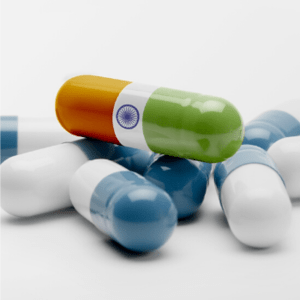Indian Pharmaceutical Sector: Covid-19 and Beyond

The ongoing COVID-19 pandemic has resulted in massive global disruption across sectors and industries. As an obvious fallout to this pandemic, pharmaceutical companies have now entered into partnerships to develop vaccinations and drugs to combat this disease. Among several contenders, India is set to play a major role in production and selling of COVID-19 vaccine worldwide. This bulk production is possible because a system of mass manufacturing (especially of generics) is already in place coupled with the well-established capacity of selling at extremely affordable prices across the globe.
The Indian pharmaceutical industry is currently world’s 3rd largest drug producer by volume. The Indian pharmaceutical market manufactures ~ 60% of vaccines globally.
Presently, India supplies affordable and low-cost generic drugs to millions of people around the globe. It operates more than 250 US Food and Drug Administration (FDA) and UK Medicine and Healthcare products Regulatory Agency (MHRA) approved plants. Furthermore, the active pharmaceutical ingredients (APIs) market is forecast to attain a revenue of USD 6 billion by the end of 2020.
India’s Dependence on Imports
The source of API is key to Indian pharmaceutical industry’s strategic plan to combat COVID-19. At present, the majority of APIs for generic drug manufacturing across the globe are sourced from India, which also supplies ~30% of the generic APIs used in the US.
However, a significant impediment is this regard is the reliability of Indian manufacturers on APIs from China. For production of their medicine formulations, around 70% of APIs are secured from China. The current reliance of Indian pharmaceutical companies on Chinese APIs poses a serious concern which in turn led the Government of India to set up a taskforce to review the internal strengths of Indian API sector. As a result, to combat the issue of APIs from China, the Government of India introduced crucial steps by proposing an incentive package for the promotion of domestic manufacturing of critical key starting materials, drug intermediates, APIs and medical devices.
The Government of India on 21 March 2020 has approved the following schemes:
a) The scheme on promotion of bulk drug parks (Promotion of Bulk Drug Parks)
b) Production Linked Incentive (PLI) scheme
Promotion of Bulk Drug Parks
Under the said scheme, it is intended to develop 3 (three) mega bulk drug parks in India by entering into partnership with respective states. The Government of India will provide grants in aid to the respective states with a maximum limit of INR 1,000 crore per bulk drug park. The proposed bulk drug park shall have facilities such as solvent recovery plant, distillation plant, power & steam units and common effluent treatment plant amongst others. A sum of INR 3,000 crore has been approved by the Government of India for Promotion of Bulk Drug Parks scheme for a period of 5 (five) years.
The Promotion of Bulk Drug Parks scheme will be implemented by state implementing agencies which shall be set up by the respective state governments. The target of the scheme is to set up 3 mega bulk drug parks. The Promotion of Bulk Drug Parks scheme is expected to generate twin benefits of reducing a) manufacturing cost of bulk drugs in the country, on one hand, and b) dependence on other countries (notably, China) for bulk drugs, on the other. However, since state governments are involved in this scheme, the success thereof would also depend on the relative flexibility, willingness and also interest of each participating state.
PLI Scheme
Under the PLI scheme, financial incentive will be given to eligible manufacturers. The eligible manufacturers shall be manufacturers who produce the identified 53 bulk drugs (Identified Drugs). Out of the Identified Drugs, 26 drugs are fermentation based bulk drugs and 27 are chemical based bulk drugs. The financial incentive shall be given on the incremental sales over the base year 2019-2020 for a period of 6 (six) years. The incentive shall be 20% (of the incremental sales value) for fermentation based bulk drugs and 10% for chemical based bulk drugs. Further, a sum of INR 6,940 crores has been approved for next 8 years.
The PLI scheme shall be implemented through a project management agency which shall be nominated by the Department of Pharmaceuticals. The PLI scheme is expected to provide two-fold benefits to India. Firstly, it would boost domestic manufacturing of critical key starting materials (KSM), drug intermediates and APIs thereby assuring a sustainable domestic supply reducing India’s dependence on other countries. Secondly, over next 8 years, it is expected to generate incremental sales of INR 46,400 crore and significant additional employment generation.
Strategic partnerships entered by Indian Pharmaceutical Companies
The Indian pharmaceutical industry, at present has great advantages. Such advantages include factors viz., the availability of a large skilled labour pool coupled with advanced technologies with high regulatory standards of markets like the US and European countries. Further, noted Indian pharmaceutical companies are also developing vaccines for COVID-19. For instance, the Serum Institute of India, the world’s largest vaccine maker by number of doses, has entered into a collaboration with Codagenix, an American biotech company to co-develop a vaccine for COVID-19. Similarly, Hyderabad-based Bharat Biotech has announced a partnership with the University of Wisconsin Madison and US-based firm FluGen for development and testing of a unique vaccine against COVID-19 called ‘CoroFlu’. Another pharma giant, Zydus group, is also developing the COVID-19 vaccine through its research arm in Europe, Etna Biotech.
Recently, Jubiliant Life Sciences, another Indian pharma major, entered into a licensing agreement with Gilead Sciences, Inc, USA. Under the said agreement, Jubiliant Life Sciences shall receive the technology to manufacture and sell drug ‘remdesivir’ in 127 countries, including India. The drug has received the authorisation from the US FDA and based on initial data shows promise to be a potential therapy for COVID-19. Jubilant Life Sciences also plans to produce the drug’s API in-house, thereby helping it achieve cost effectiveness and consistent availability.
Way forward
The synergies of Indian pharmaceutical companies and pro-active steps / schemes taken by the Government of India will a) help in positioning India as a strong contender in the race for developing the COVID-19 vaccine and b) go a long way in enabling Indian pharma sector to enhance reach in global markets like never before. It will be interesting to see the turn of events and developments unfolding in the imminent future.
Author: Souvik Ganguly
The information contained in this article is not legal advice or legal opinion. The contents recorded in the said document are for informational purposes only and should not be used for commercial purposes. Acuity Law LLP disclaims all liability to any person for any loss or damage caused by errors or omissions, whether arising from negligence, accident, or any other cause.



